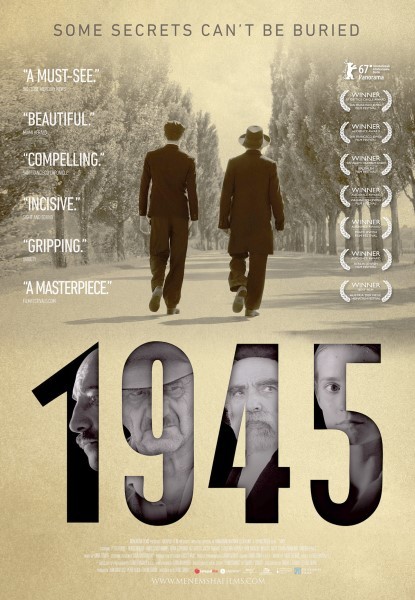A new film, ‘1945,’ to be shown Feb. 10 at Temple Emanu-El
Arts Emanu-El takes you back to 1945 with a compelling new film of the same name. “1945” was written by the novelist and screenwriter Gabor Szanto, whose short story, “Homecoming” (2004), serves as the basis for the film.
This is not a Holocaust film. It is a film that dissects life in a provincial village, and investigates the effect that events had on the Hungarian population as a whole, without limiting itself to the Jewish population. The village in which the film is set suffered the evils of the Holocaust in 1944. The first frame of the movie takes place one year later when two orthodox Jewish men return home and disrupt the established rhythm of village life. This reappearance forces local residents to confront the terrible events of the previous year: the forced deportations, what they did and did not do, what happened to the belongings left behind and who made which decisions.
According to the film’s director, Ferenc Torok, this is a period in Hungarian history that is not overly represented in either film or literature. Torok finds the film interesting from two perspectives: It is set in 1945 when the German troops were gone and Soviet “liberators” were stationed in a country that was preparing for democratic elections. It is a social tableau that portrays life in Hungary just after the war. It explores new beginnings and how society must overcome trauma, start a new journey, and confront the past in order to undertake a new life. It is a drama that confronts the audience with real-life situations.
“1945” concentrates on the point of view of the locals who share guilty secrets about ill-gotten gains. For some, their remorse becomes overwhelming, while for others their determination to keep their comfortable new homes and fine furnishings, including traditional Jewish candelabra and Hebraic art, overrides any compunction to behave in an ethical manner.
With little dialogue, we are able to examine village life, and matters of conscience by what we see in the film. Other noteworthy elements of the film are its melancholy score, which recalls forgotten Jewish melodies from Tibor Szemzo (“The Tree of Life”), as well as spot-on period production design by Dorka Kiss, and the very well-conceived costume work of Sosa Juristovszky. The film also contains striking black-and-white lensing.
Ted Koppel called the film “extraordinary” and “amazing.”
“This film is truly, and I mean it in the best sense of the word, Hitchcockian: in the manner in which it creates a sense of suspense and dread – it’s just an extraordinary film. I urge you to see it,” he writes.
Eric Goldman of The Jewish Standard writes: “Powerful…director Forenc Torok is a master. Beautifully photographed, raises important questions, and gives us a perspective on a Hungary seemingly ready to tackle difficult questions. I highly recommend it.”
Arts Emanu-El’s objective is to reach out and invite others in the community who wish to enjoy and expand their knowledge of interesting and entertaining Jewish culture. The film will be shown Saturday, Feb. 10, at 7:30 p.m. Light food fare will be served. Tickets: $12 in advance; $15 at the door. For information, please call Temple Emanu-El at 401-331-1616 and inquire about a link to purchase tickets.
Pamela Hanzel is chair of Arts Emanu-El at Temple Emanu-El.








